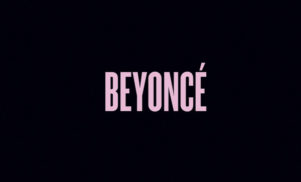Available on: Columbia Records
Let’s just get this out of the way: the unexpected, unpromoted, record-breaking release of Beyoncé will end up being the least interesting part of the album’s story. Before Beyoncé’s midnight surprise, the year had already been marked by a handful of albums that were released with less fanfare than usual, by everyone from My Bloody Valentine to Jay Z, and despite declining sales throughout the industry, Beyoncé is a global icon with over 100 million records sold worldwide.
What will persist when discussing Beyoncé’s self-titled fifth album, however, is how damn good it is: in a year of major rap, R&B, and pop releases, Beyoncé outclasses them all. A tour through Beyoncé’s backstory, a meditation on Third Wave feminism and a rejection of perfection, Beyoncé is the singer at her rawest, realest, and most personal, with a sound deeper and darker than ever before.
Unlike 4, which looked to soul hits of the ’70s and ’80s for inspiration, Beyoncé’s prevailing palette is the woozy Southern hip-hop that is both the music of the singer’s youth and a key influence for contemporary rap and R&B. The album is loaded with trunk-rattling bass, machinegun hi-hats and synths both soft and shrill, resulting in an effort that owes more to rap than any Beyoncé album since the bombastic B’Day.
Beyoncé is certainly comfortable with it: the bipartite ‘Haunted’ moves from smoky ethereality to an off-kilter club beat somewhere between Jacques Greene and Burial, a foreboding composition in which she raps a caustic industry takedown and sings a seductive hook that is, well, haunting. On ‘Mine’, she takes Drake’s ‘Wu-Tang Forever’ pronouncement (“it’s yours”) to heart, making 40’s slow-burning beat her own and turning Drake into a feedback-obscured hook man. Album highlight ‘***Flawless’, an expanded version of the previously released ‘Bow Down’, removes the chopped-and-screwed ‘I Been On’ component but keeps the H-Town menace on her most confrontational display of pop dominance to date.
Since first debuting earlier this year, the “bow down bitches” refrain of ‘***Flawless’ has been a source of countless “Is Beyoncé A Feminist Or Not?” discussions. It’s certainly an argument she’s ready to lean into on the album, handing over the second verse of the song to Nigerian author Chimamanda Ngozi Adichie and excerpting a speech that practically defines Third Wave Feminism. But while Beyoncé tackles female self-image on ‘Pretty Hurts’ and relationship equality on the ‘If I Were A Boy’-reminiscent ‘Jealous’, it’s the flaunting of her sexuality that will keep those think pieces coming.
Sex is all over the record, and not just in the vague suggestions of something like ‘Naughty Girl’. While ‘Blow’ (fueled by a vintage turn from Pharrell and Timbaland) keeps things relatively light with a “lick my skittles” analogy and ‘Rocket’ turns her sex life into topography, ‘Partition’ is all “‘yonce on her knees,” complete with a surprising (if not quite timely) Monica Lewinsky reference and a feminist speech from (no kidding) the French version of The Big Lebowski. Ready or not, Beyoncé’s newfound explicitness is part of a personal brand of feminism that allows her to be a wife, a mother, and a sex goddess.
But for all the “I woke up like this” self-confidence on Beyoncé, the most common lyrical theme is perfection. She describes it as “the disease of a nation” on ‘Pretty Hurts’, and shrugs it off masterfully on ‘Haunted’; on ‘No Angel’, she puts theory into practice, with an imperfect but touching performance, her cooing breathy and flawed. Throughout, she keeps returning to the theme: she’s “no angel,” she’s “just human,” and her aspiration is simply “to be happy.” In a year that saw the release of her confessional-but-calculated Life Is But A Dream documentary, it’s a refreshing bit of honesty and humanity from the singular pop star of our age.
Like the singer herself, Beyoncé is not perfect. ‘Drunk in Love’ is the requisite duet with Jay Z (whose Ike Turner-referencing verse caps off a year of cringeworthy efforts), ‘XO’ reeks of Ryan Tedder’s paint-by-number hitmaking, and while ‘Rocket’ is a pitch-perfect rehash of D’angelo’s ‘Untitled (How Does It Feel)’, it seems unnecessary here. Thankfully, the album closes strongly and subtly with a trio of low-key ballads: the Frank Ocean-assisted ‘Superpower’, the somber ‘Heaven’, and the joyful ‘Blue’. The latter pair are two sides of the same coin: the heartbreaking ‘Heaven’ is most likely about her miscarriage, while ‘Blue’ celebrates (and features) daughter Blue Ivy in what is sure to become a wedding song for the ages.
As she sings on ‘Rocket’, Beyoncé can be “a piece of sunshine, inner peace, entertainer.” The closest thing we have to a monoculture pop star, Beyoncé is fine with being all things to all people, but as she makes clear on this album, it will be on her own terms. Beyoncé is a stronger personal statement than Magna Carta… Holy Grail, less self-indulgent than The 20/20 Experience, and (in its own way) as dark and confrontational as Yeezus. Beating the boys at their own game — how’s that for feminism?

































